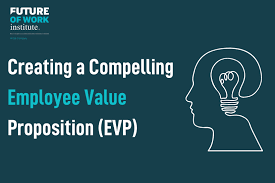In today’s highly competitive labor market, attracting and retaining the best talent has become more challenging than ever. Employers must go beyond traditional recruitment methods and focus on what truly matters to employees—values, culture, growth opportunities, and work-life balance. One of the most effective tools in achieving this is a compelling employee value proposition (EVP).
An employee value proposition is essentially the promise a company makes to its employees about what they can expect in return for their skills, commitment, and contributions. It is an attractive and unique combination of the benefits, culture, career growth opportunities, and work environment that an organization offers to its workforce. The EVP goes beyond just salary and benefits to include the broader employee experience, encompassing everything from work-life balance to opportunities for personal development.
A strong EVP can be a game-changer for an organization. It can help employers attract high-quality candidates, engage their current workforce, and increase retention. With an effective EVP, companies not only meet the expectations of their employees but also exceed them, creating an environment where people want to stay, grow, and contribute.
In this article, we will explore what makes a strong employee value proposition, how to develop one that resonates with your target workforce, and how to communicate it effectively. From understanding your employees’ needs to leveraging your organizational strengths, we’ll provide insights on how to craft a compelling EVP that will help your company stand out in the talent market.
What Is an Employee Value Proposition?
An employee value proposition (EVP) refers to the unique set of offerings, rewards, and benefits that an employer provides to its employees in exchange for their time, skills, and efforts. It’s the combination of tangible and intangible factors that make an organization an attractive place to work. The EVP encompasses everything an employee experiences as part of their relationship with the company—from the corporate culture to career growth opportunities and beyond.
Think of the EVP as the employer’s promise to its employees, detailing what they can expect in return for their dedication and hard work. When crafted effectively, an EVP aligns the interests of the company and the employee, driving satisfaction, loyalty, and long-term engagement.
Why Is an Employee Value Proposition Important?
The importance of an effective employee value proposition cannot be overstated. It plays a key role in several critical areas of organizational success:
- Attracting Top Talent: A well-crafted EVP helps you stand out in a crowded job market. It showcases why your company is a desirable place to work and communicates the unique benefits you offer to potential employees.
- Boosting Employee Engagement: A strong EVP ensures that employees feel connected to the company and its values. When employees understand what they are working towards and what they are being offered in return, they are more likely to be engaged and motivated.
- Improving Retention: Employees who believe in the EVP and feel valued by their employer are less likely to leave. A compelling EVP addresses employees’ desires for job security, career growth, and work-life balance, helping to reduce turnover and retain talent for the long term.
- Enhancing Employer Brand: The EVP is central to your employer brand. When employees have a positive experience, they are more likely to share that experience with others, whether in reviews on Glassdoor or through word of mouth. This strengthens your company’s reputation as an employer of choice.
- Fostering a Positive Work Culture: A strong EVP helps align the company’s culture with employee expectations. This alignment fosters a positive work environment where employees feel supported, valued, and empowered to perform at their best.
Key Elements of an Employee Value Proposition
Creating a strong employee value proposition requires a deep understanding of what employees value most. While each company’s EVP will be unique, there are several common elements that are typically included:
Compensation and Benefits
At the most basic level, employees expect competitive compensation and a solid benefits package. This includes salary, health insurance, retirement plans, paid time off, and other perks such as bonuses or stock options. However, today’s employees are looking for more than just the paycheck—they want a complete package that supports their well-being, lifestyle, and future.
Career Development and Growth Opportunities
Employees want to know that they have opportunities to grow and advance within the organization. Offering training programs, mentorship, clear career progression paths, and opportunities for internal mobility can make your EVP highly attractive. Companies that invest in employee development show a commitment to their staff’s long-term success.
Work-Life Balance
In today’s fast-paced world, employees value flexibility. The ability to balance personal responsibilities with work is a key selling point for many job seekers. Flexible work hours, remote work options, and paid parental leave are all important components of work-life balance. Offering these options can enhance your EVP and appeal to a wide range of candidates.
Company Culture and Values
Your company’s culture is a key factor in shaping the EVP. A positive, inclusive, and collaborative culture where employees feel valued and supported will make your EVP more compelling. An EVP should also reflect the values of the company—whether it’s a focus on innovation, diversity, or social responsibility—so that employees feel connected to the organization’s mission.
Recognition and Rewards
Employees want to feel appreciated for their contributions. Recognition can come in many forms: praise from managers, public acknowledgment of achievements, promotions, and other tangible rewards. A strong recognition program can be a powerful part of the EVP, motivating employees to perform at their best.
Job Security and Stability
Especially in uncertain economic times, employees value job security. When crafting your EVP, it’s important to emphasize the company’s stability and growth prospects. Employees want to feel confident that they are working for a company that is secure and has a positive future.
Leadership and Management Style
The leadership team plays a crucial role in shaping the EVP. A transparent, supportive, and approachable leadership style builds trust and strengthens employee loyalty. Leaders who are committed to fostering a positive work environment and who take the time to mentor their employees can create a powerful EVP.
Health and Well-being
Employees today are more focused on their overall well-being. Offering programs that support both physical and mental health—such as wellness initiatives, gym memberships, mental health days, and counseling services—can significantly enhance your EVP.
Social Responsibility and Sustainability
More employees today are seeking out employers that are socially responsible and committed to sustainability. A company’s dedication to ethical practices, environmental sustainability, and community involvement can be a strong part of its EVP, particularly for younger generations who value corporate social responsibility.
Employee Autonomy and Empowerment
Employees appreciate an environment where they are trusted to make decisions and have autonomy in their roles. A company that allows employees to take ownership of their projects and contribute ideas is more likely to foster a culture of engagement and innovation.
Diversity and Inclusion
A diverse and inclusive workplace is no longer optional—it’s a key component of any strong EVP. Employees want to work in environments where everyone, regardless of background, feels respected and valued. A commitment to diversity and inclusion can make your EVP much more attractive to a wide range of candidates.
Workplace Flexibility and Innovation
As remote work becomes more common, employees want to know that their workplace is flexible and adaptable. A company that embraces innovation and allows employees to work in ways that suit their needs—whether remotely or through flexible hours—will have a more appealing EVP.
Team Dynamics and Collaboration
Employees are looking for a work environment where teamwork and collaboration are encouraged. A supportive team dynamic and opportunities for cross-functional collaboration can make your EVP much more attractive. The ability to work together towards common goals can lead to higher employee satisfaction and a more cohesive work environment.
How to Develop an Employee Value Proposition
1. Understand Your Employees’ Needs
The first step in developing an effective EVP is to understand what your current employees value. This requires gathering feedback through surveys, interviews, and focus groups. Understanding what matters most to your workforce—whether it’s career development, work-life balance, or compensation—will help you tailor your EVP to meet those needs.
2. Analyze Competitors’ EVPs
It’s important to understand what other companies in your industry are offering. This allows you to identify areas where you can differentiate your EVP and stand out from the competition. Look at what benefits, perks, and cultural elements are emphasized by your competitors and consider how you can offer something unique.
3. Align Your EVP with Company Values and Goals
Your EVP should be aligned with your company’s values, culture, and long-term goals. It should reflect your organization’s mission and what it stands for. When your EVP is aligned with your company’s broader strategy, it creates a sense of purpose and connection for employees.
4. Communicate Your EVP Clearly
Once you’ve developed your EVP, it’s important to communicate it clearly and consistently. Ensure that your messaging is reflected in your job postings, your onboarding process, and internal communications. Every touchpoint with potential and current employees should reinforce your EVP and the unique benefits of working at your organization.
5. Measure and Adjust
An EVP is not a static entity—it should evolve over time as employee needs and market conditions change. Regularly assess the effectiveness of your EVP through employee feedback and performance metrics. Make adjustments as needed to ensure that your EVP remains relevant and continues to meet the needs of your workforce.
FAQs
What is the difference between an Employee Value Proposition (EVP) and Employer Branding?
The employee value proposition (EVP) refers specifically to the unique set of benefits, culture, and opportunities that a company offers its employees in return for their contributions. It focuses on the internal employee experience. On the other hand, employer branding refers to how an organization is perceived by potential job candidates and the broader public. It encompasses the reputation and image of the company as an employer, which is influenced by the EVP but also includes elements like public relations, social media presence, and external communications.
Conclusion
Creating and maintaining a strong employee value proposition (EVP) is crucial for attracting, engaging, and retaining top talent. A compelling EVP not only addresses employees’ needs and aspirations but also aligns with the company’s culture and values. By understanding what employees value most and communicating the unique benefits your organization offers, you can build a workforce that is motivated, loyal, and productive. A strong EVP drives employee satisfaction, reduces turnover, and enhances your employer brand, ultimately contributing to the long-term success of the business.







